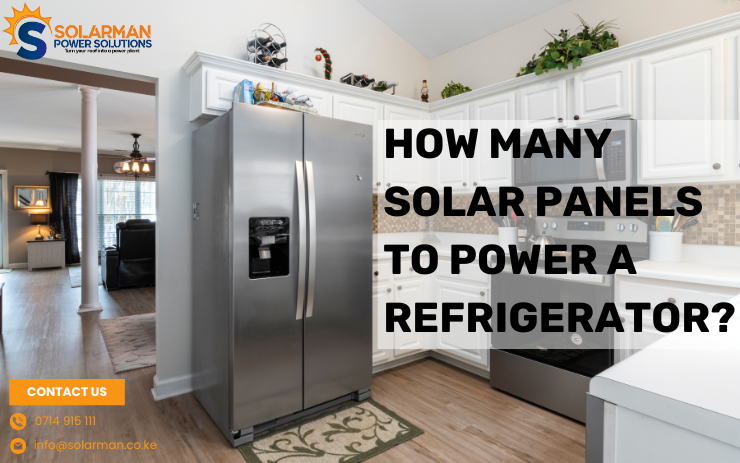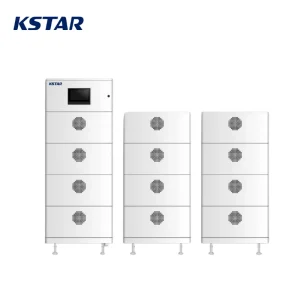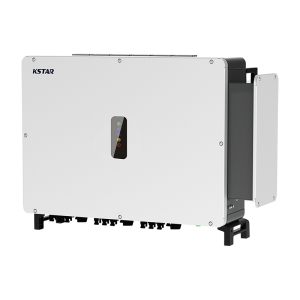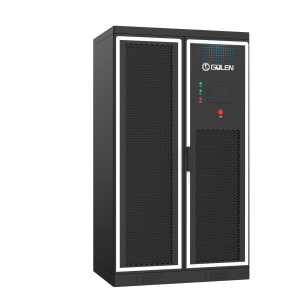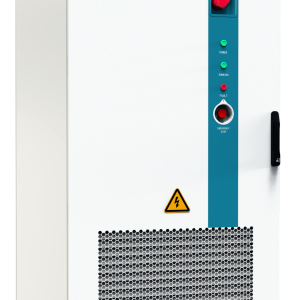Solar energy is becoming more popular in Kenya as a reliable and eco-friendly way to power homes and businesses.
If you’re considering switching to solar, you might be wondering: How many solar panels do I need to power a refrigerator?
The answer depends on several factors, including the size of your fridge, its energy consumption, and the efficiency of the solar panels.
In this article, we’ll break it down step by step, explain how solar panels and batteries work together to keep your fridge running, and highlight why choosing a high-quality solar system from Solarman is a smart decision.
How Much Power Does a Refrigerator Use?
The first step in figuring out how many solar panels you need is understanding how much electricity your refrigerator uses.
Types of Refrigerators and Their Power Consumption:
- Small Fridges (100–200L): Use about 100–200 watts continuously.
- Medium Fridges (200–400L): Use about 150–300 watts continuously.
- Large Fridges (400L+): Use about 300–600 watts continuously.
Most refrigerators also have a surge power when the compressor starts. This surge can be up to 1,200 watts for a few seconds, which your solar system must handle.
Daily Energy Usage:
To calculate daily energy consumption, multiply the fridge’s power usage by the number of hours it runs. For example:
- A medium fridge using 200 watts continuously:
200W × 24 hours = 4,800 watt-hours (4.8 kWh)
How Much Power Can a Solar Panel Generate?
Solar panels produce electricity depending on their size, efficiency, and the amount of sunlight they receive.
In Kenya, where sunlight is abundant, a typical solar panel generates about 4–5 kilowatt-hours (kWh) per day.
Common Solar Panel Capacities:
- 100W Panel: Produces about 0.4–0.5 kWh per day.
- 300W Panel: Produces about 1.2–1.5 kWh per day.
- 550W Panel: Produces about 2.2–2.5 kWh per day.
How Many Solar Panels Do You Need to Power a Fridge?
Now let’s calculate how many panels you need based on your fridge’s daily energy usage and the panels’ output.
Step-by-Step Calculation:
Find Your Fridge’s Daily Energy Use:
For example, a medium fridge uses 4.8 kWh per day.Determine Solar Panel Output:
A 550W solar panel generates about 2.5 kWh per day in Kenya.Divide Fridge Usage by Panel Output:
4.8 kWh ÷ 2.5 kWh = 2 panels
So, you’ll need two 550W solar panels to power a medium fridge.
Why Do You Need a Solar Battery?
Solar panels only produce electricity when the sun is shining. To keep your fridge running at night or during cloudy weather, you’ll need a solar battery to store the energy.
How Much Battery Capacity Is Needed?
- A medium fridge uses 4.8 kWh per day.
- To store enough energy for one day, you’ll need a battery with at least 5 kWh capacity.
At Solarman, we offer reliable solar batteries, including:
- 5 kWh Lithium-Ion Batteries for small to medium systems.
- 10 kWh Batteries for larger setups or longer backup periods.
What Affects the Number of Solar Panels You Need?
Several factors can influence how many solar panels you need for your fridge:
1. Sunlight Hours:
- In sunny areas like most parts of Kenya, panels produce more energy, reducing the number needed.
- During cloudy weather, panel output decreases, making a battery even more critical.
2. Efficiency of the Panels:
- High-efficiency panels produce more energy, requiring fewer panels overall.
3. Fridge Type and Age:
- Older or less efficient fridges use more energy, requiring additional panels.
4. Other Appliances:
- If you’re powering more than just a fridge, consider the combined energy usage when calculating the number of panels needed.
Why Choose Solarman for Your Solar Needs?
At Solarman, we provide high-quality solar systems tailored for homes and businesses in Kenya.
Here’s why we’re the best choice:
- Durable Products: Our panels and batteries are built to last, even in harsh conditions.
- Affordable Pricing: We offer competitive prices without compromising on quality.
- Professional Installation: Our expert team ensures your system is installed safely and operates efficiently.
- Custom Solutions: We help you choose the perfect setup based on your energy needs.
- After-Sales Support: From maintenance tips to troubleshooting, we’re here to help.
Example Solar Systems for Powering a Fridge
Here are some setups we recommend for running a fridge and other basic appliances:
Option 1: Small System for a Small Fridge
- 1 x 300W Solar Panel
- 1 x 5 kWh Lithium-Ion Battery
- 1.5 kW Inverter
- Powers: Small fridge, lights, WiFi, and phone chargers.
Option 2: Medium System for a Medium Fridge
- 2 x 550W Solar Panels
- 1 x 5 kWh Lithium-Ion Battery
- 3 kW Inverter
- Powers: Medium fridge, lights, TV, and laptop.
Option 3: Large System for a Large Fridge
- 4 x 550W Solar Panels
- 1 x 10 kWh Lithium-Ion Battery
- 5 kW Inverter
- Powers: Large fridge, freezer, lights, TV, and more.
How to Maintain Your Solar System
Solar systems are low-maintenance, but a little care can go a long way:
- Clean the Panels: Dust and dirt reduce efficiency. Wipe them with a soft cloth and water every few months.
- Check Battery Levels: Avoid completely draining or overcharging the battery.
- Inspect Wiring: Ensure all connections are secure and free of damage.
- Monitor Performance: Use a solar monitoring system to track energy production.
FAQs
1. How many solar panels do I need to power a fridge?
For a medium fridge, you’ll need two 550W panels to generate enough energy daily.
2. Can I run a fridge without a battery?
No, a battery is needed to store energy for use at night or during cloudy weather.
3. How much does a solar system for a fridge cost?
At Solarman, prices depend on the setup. A small system for a fridge starts at around KSh 110,000.
4. Do I need a special inverter for a fridge?
Yes, an inverter must handle the fridge’s power needs, including its surge power. A 1.5 kW or 3 kW inverter is usually sufficient.
5. How long does a solar battery last?
A high-quality lithium-ion battery can last 10–15 years with proper care.
- Solar Solutions
KSTAR Indoor Energy Storage Battery — BC-PACK-20.1-20S-157A 100kWh
KSh 2,500,000Original price was: KSh 2,500,000.KSh 1,950,000Current price is: KSh 1,950,000. Add to cart - Uncategorized
KSTAR BlueKernel Series 125kW Three-Phase Commercial & Industrial Solar Inverter (G125KT7)
KSh 1,000,000Original price was: KSh 1,000,000.KSh 850,000Current price is: KSh 850,000. Add to cart - Solar Battery
Golen LEG-250K/500K-TT-B Commercial Power Conversion System (PCS) – C&I Energy Storage Inverter Kenya
KSh 3,800,000Original price was: KSh 3,800,000.KSh 3,514,390Current price is: KSh 3,514,390. Add to cart - Solar Battery
🔋 Golen Power 241kWh Outdoor Energy Storage Cabinet (C&I ESS)
KSh 4,000,000Original price was: KSh 4,000,000.KSh 3,777,995Current price is: KSh 3,777,995. Add to cart

